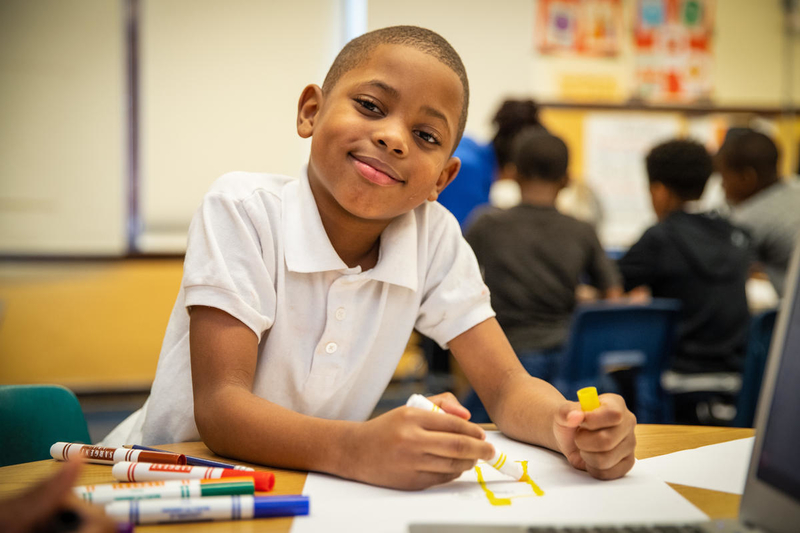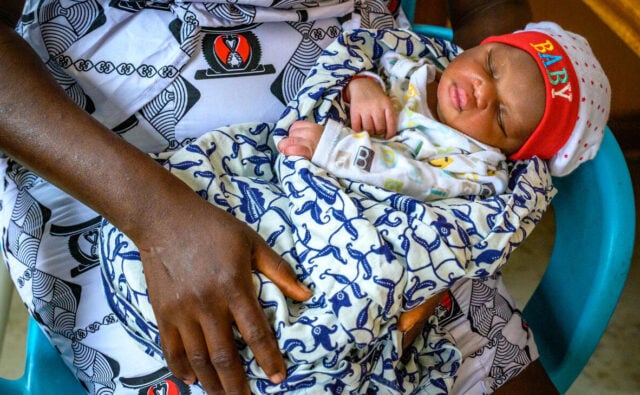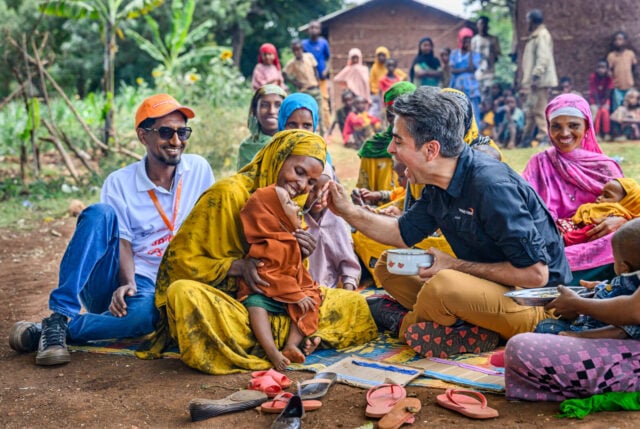Elections bring up some tough questions for Christians. The Bible encourages us to live quiet lives (1 Thessalonians 4:11), but election topics trend toward the decidedly un-quiet. Then again, God calls us to actively seek justice (Isaiah 58:6), and isn’t participating in national decisions one of the best ways we can do that? And how do we maintain an attitude of Christian love and humility when we’re bombarded with us-versus-them rhetoric, name-calling between adults, and an inescapable onslaught of negative political ads?
And if you’re a parent, you may be wrestling with these topics just as you hear a little voice coming from the backseat: “Who are you voting for?”
Where’s the instruction manual for talking to your kids about the election? How do we teach children Christian values while encouraging them to think on their own?
In Ephesians, Paul writes, “Fathers, do not exasperate your children; instead bring them up in the training and instruction of the Lord” (Ephesians 6:4). Good advice, but it’s easy to wish Paul had included a few more details on how to do that!
Raising kids is challenging, and the election season brings up a whole new array of questions for parents and caregivers. Thankfully, we can go to God with our questions and ask for grace when we don’t get it right. When we go to God with our struggles and questions, we remind ourselves that our trust is in him, no matter who’s on the ballot. And when young eyes are watching us, putting our trust in God — in word and action — may be more powerful than anything we could ever say.
We talked to Licensed Marriage and Family Therapist Valerie Kadera and came up with 10 tips for talking to kids about the election in a way that’s empowering, reassuring, and God-honoring.
1. Talk when your kids are ready.
Like a lot of things with raising children, it’s hard to know when your child is “ready.” Are they ready for the two-wheeler, or is it best to stick to training wheels? A good indication it’s time for an age-appropriate election chat is if your child is starting to ask questions or make comments. Most kids won’t directly communicate their curiosity, but they’ll give you clues that they’re ready to talk by what they say and ask about.
Start by asking them what they’ve heard and what they think (this will also help you gauge if they’re stressed about the election or merely curious). If they’ve heard scary rumors, you can dispel those and talk about the importance of not repeating information that might not be true. If they’re curious, explain why we have elections and that they’ll get to participate someday.
“The biggest thing parents can do is model calm behavior,” Kadera says. “The more distressed parents are, the more distressed kids will be.” If we start the discussion with a calm and open attitude, kids will be more open to sharing their thoughts and continuing to ask questions.
2. Explain how our government works.
Elections are a great opportunity to introduce younger kids to the idea of democracy and using our voices to help our leaders make decisions. We can share that elections mean that the same people don’t always get to make all the decisions and how voting helps create and change laws to help our country. It can be good for kids to know that even though elections are often stressful, the idea behind them is positive.
Older kids might have questions about political parties, and that gets tougher! As kids are starting to form their own opinions, it’s important to make clear that there isn’t only one party for Christians, Kadera says. Explain how people can love and serve Jesus and still make different decisions when they vote. This can be a tough concept, especially for kids who tend to see things as black and white, but by introducing the idea early, we help them be welcoming to people who think differently than them and encourage an attitude of discussion. Let them know that regardless of who is elected, our government has to find ways to work together even when they disagree, like families have to work together.
3. Be mindful of stress.
It can be scary for kids when they see people disagree, Kadera says, especially if they deal with insecurity of their own. Kids are amazingly perceptive of attitudes behind words and can sense underlying feelings. Take your child’s age and emotional maturity into account when deciding what to talk about and how much to expose them to — who your child is as an individual is more important than what other kids their age can handle. Some children might be highly sensitive to charged topics in the news or around the schoolyard while others couldn’t care less.
Take stock of how much information they’re consuming through social media and TV (even if the TV is on in the background) and limit exposure as needed. Finally, be mindful that kids may pick up on more than you realize, especially when it comes to our election-related stress. “Parents are the biggest influence on their kids — not social media, not the news, not the election,” Kadera says.
4. Help kids express what they’re feeling.
Kids need to be able to express what they’re feeling, and parents should be the first place a child can go to when they’re feeling confused, nervous, or overwhelmed. Kadera says that it’s vital that parents listen and validate what kids are feeling instead of dismissing or minimizing their emotions. Their emotions may be disproportionate to the situation, but we can validate emotions without validating behavior.
Election coverage may provide some examples of how not to deal with emotions, and we can call out that behavior to our kids. We might say something like, “The thing that upsets me is that people are not being kind and respectful while they’re upset. It’s okay to be upset, but how you treat people matters,” Kadera says.
5. Help kids form their own opinions.
Critical thinking is a vital skill for kids to develop. Younger kids are more likely to agree with whatever their parent says, whereas older kids and teens will want to test their parents but still feel safe expressing their opinions.
Teens are figuring out who they are, Kadera says, and will do so by both identifying with parents and differentiating from them. She recommends that parents take a curious stance instead of getting into a debate. Asking a teen questions like, “Why do you think that?” or “What about this scenario?” will both help them think critically and let them know it’s safe for them to express opinions with you.
For younger kids, you might explain that the election is a time when people help the government make decisions about tough problems. Try to find something relevant to them. Have they noticed something they don’t like or that’s unfair at school or with friends? What kind of rule would they make to address that? How could they make sure things are as fair as possible?
And at any age, if kids are asking questions about elections or politics, we should commend them for their interest and thoughtfulness. “Being supportive of critical thinking and engagement is really important,” Kadera says. “It’s great that they’re making sense of their world, even if it’s not what parents want.”
6. Help them have a sense of agency.
Reminding our kids that they have agency is a great way to help them deal with emotions and frustrations as well as show them the positive side of election season. If they’re excited about the election or passionate about an issue, encourage them to grow that passion! Kids may not be able to vote, but they can write a letter or encouraging note to their representative, learn more about a topic they care about, donate to a cause, or volunteer their time. Remind kids that voting is only one way we work to make our world a better place, and there’s no age-minimum for caring for others.
And of course, we can pray with our kids that God will take good care of our country and help our leaders make good decisions. God tells us to pray for our leaders (1 Timothy 2:1-2), and he listens to our prayers!
“Giving our kids action steps along with their emotions helps them feel safe that their emotions aren’t just going nowhere,” Kadera says.
7. Show them how to have honest, respectful dialogue.
Our actions speak louder than our words. So when we talk about values of kindness, humility, and respect, we have to make sure we’re demonstrating that for our kids. Kids are always more keyed into what we’re doing than what we’re saying, Kadera says.
Remind kids that listening respectfully to someone and asking questions isn’t the same as agreeing with someone, and we can disagree with someone and still treat that person with kindness. Ask your kids if they’ve seen examples of this being done well or done poorly, and let them know that adults don’t always get this right either. For younger kids, it may be helpful to ask them how they feel when someone interrupts them or doesn’t listen to them. For older kids, emphasize that having honest, open discussion is both harder and more valuable than going for quick “gotcha!” moments. Encourage them to seek out people whose opinions and experiences differ from their own so they can learn from them.
8. Talk about values.
Our kids pick up more on the values we show than the values we verbalize. Kadera says that kids may know what their parents value more than parents realize because they’re so adept at picking up on unexpressed values. Parents are the biggest influence on their kids — so how we show our values is even more important than how we talk about them.
In election season, we use our values to inform our votes. Let your kids know that our values as Christians inform how we vote and get involved — not the other way around. Ask your kids what they value and talk about what you value as a family. Let them know that you do your best to make good decisions when you vote based on those values.
9. Help kids understand why people get so upset about politics.
Explain that the reason behind stress and anger is often fear, helplessness, or powerlessness, Kadera says. Remind kids that it’s okay to be upset, but it’s not okay to be unkind. You can also point out that grown-ups don’t always get it right, and just because someone is an adult — even a powerful adult — it doesn’t always mean they are making God-honoring decisions. (This is a great chance to model how we should go to God with our frustration and ask for his help!)
You could also help kids understand why some people don’t want to talk about the election at all. Because people aren’t always able to make good decisions with their emotions, things can get heated quickly when talking about politics. Let your child know that other people may not be comfortable talking about election topics with them even if they’re being careful to be kind. And in the same way, it’s always okay for them to say no to a conversation if they feel uncomfortable.
10. Strike a balance: Empower kids and protect them.
I think ultimately our job as parents is to keep [our kids] safe, but protecting them from everything is not safe because ultimately, they’re going to have to be in the world.—Valerie Kadera, licensed marriage and family therapist
Deciding how to balance empowering and protecting kids is something every parent struggles with — sometimes moment by moment. What one child can handle may not be what your child can handle or is even interested in. We can empower our kids by asking them what they care about: What do you want to be involved in? What matters to you? What do you think would honor Jesus?
Help them find a way to voice their opinions and take action if they’re interested. Empower them as they grow and experience more and more of the world. “Give them a little bit more as they grow older and protect them a little bit less,” Kadera says. “Every day you’re trying to figure that out. There is no right answer — it’s just what works for your kid.”
Valerie Kadera, a licensed marriage and family therapist, contributed to this article.


